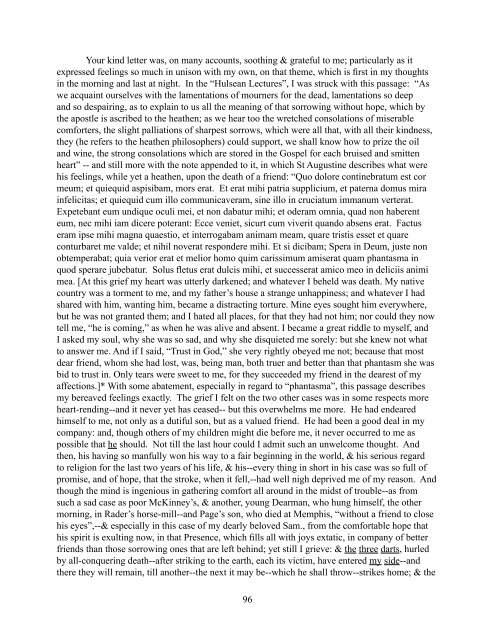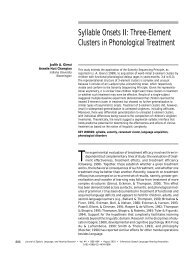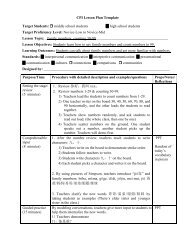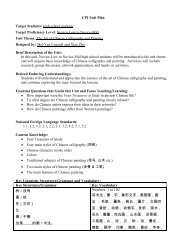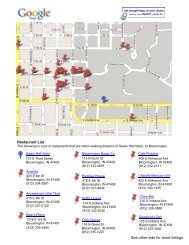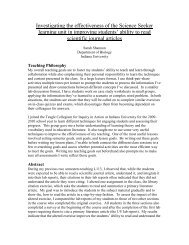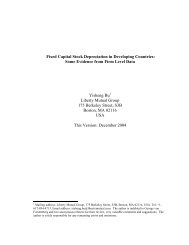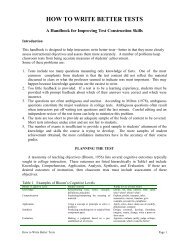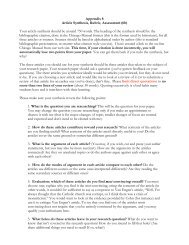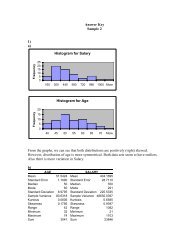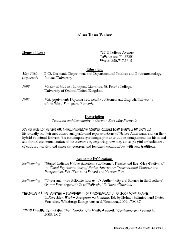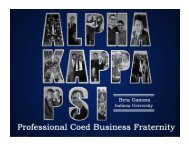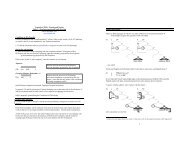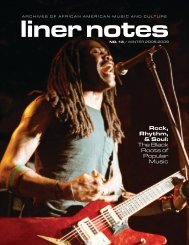The Andrew Wylie Family Letters - Indiana University Bloomington
The Andrew Wylie Family Letters - Indiana University Bloomington
The Andrew Wylie Family Letters - Indiana University Bloomington
Create successful ePaper yourself
Turn your PDF publications into a flip-book with our unique Google optimized e-Paper software.
Your kind letter was, on many accounts, soothing & grateful to me; particularly as it<br />
expressed feelings so much in unison with my own, on that theme, which is first in my thoughts<br />
in the morning and last at night. In the “Hulsean Lectures”, I was struck with this passage: “As<br />
we acquaint ourselves with the lamentations of mourners for the dead, lamentations so deep<br />
and so despairing, as to explain to us all the meaning of that sor rowing without hope, which by<br />
the apostle is ascribed to the heathen; as we hear too the wretched consolations of miserable<br />
comforters, the slight palliations of sharpest sorrows, which were all that, with all their kindness,<br />
they (he refers to the heathen philosophers) could support, we shall know how to prize the oil<br />
and wine, the strong consolations which are stored in the Gospel for each bruised and smitten<br />
heart” -- and still more with the note appended to it, in which St Augustine describes what were<br />
his feelings, while yet a heathen, upon the death of a friend: “Quo dolore continebratum est cor<br />
meum; et quiequid aspisibam, mors erat. Et erat mihi patria supplicium, et paterna domus mira<br />
infelicitas; et quiequid cum illo communicaveram, sine illo in cruciatum immanum verterat.<br />
Expetebant eum undique oculi mei, et non dabatur mihi; et oderam omnia, quad non haberent<br />
eum, nec mihi iam dicere poterant: Ecce veniet, sicurt cum viverit quando absens erat. Factus<br />
eram ipse mihi magna quaestio, et interrogabam animam meam, quare tristis esset et quare<br />
conturba ret me valde; et nihil noverat respondere mihi. Et si dicibam; Spera in Deum, juste non<br />
obtemperabat; quia verior erat et melior homo quim carissimum amiserat quam phantasma in<br />
quod sperare jubebatur. Solus fletus erat dulcis mihi, et successerat amico meo in deliciis animi<br />
mea. [At this grief my heart was utterly darkened; and whatever I beheld was death. My native<br />
country was a torment to me, and my father’s house a strange unhappiness; and whatever I had<br />
shared with him, wanting him, became a distracting torture. Mine eyes sought him everywhere,<br />
but he was not granted them; and I hated all places, for that they had not him; nor could they now<br />
tell me, “he is coming,” as when he was alive and absent. I became a great riddle to myself, and<br />
I asked my soul, why she was so sad, and why she disquieted me sorely: but she knew not what<br />
to answer me. And if I said, “Trust in God,” she very rightly obeyed me not; because that most<br />
dear friend, whom she had lost, was, being man, both truer and better than that phantasm she was<br />
bid to trust in. Only tears were sweet to me, for they succeeded my friend in the dearest of my<br />
affections.]* With some abatement, especially in regard to “phantasma”, this passage describes<br />
my bereaved feelings exactly. <strong>The</strong> grief I felt on the two other cases was in some respects more<br />
heart-rending--and it never yet has ceased-- but this overwhelms me more. He had endeared<br />
himself to me, not only as a dutiful son, but as a valued friend. He had been a good deal in my<br />
company: and, though others of my children might die before me, it never occurred to me as<br />
possible that he should. Not till the last hour could I admit such an unwelcome thought. And<br />
then, his having so manfully won his way to a fair beginning in the world, & his serious regard<br />
to religion for the last two years of his life, & his--every thing in short in his case was so full of<br />
promise, and of hope, that the stroke, when it fell,--had well nigh deprived me of my reason. And<br />
though the mind is ingenious in gathering comfort all around in the midst of trouble--as from<br />
such a sad case as poor McKinney’s, & another, young Dearman, who hung himself, the other<br />
morning, in Rader’s horse-mill--and Page’s son, who died at Memphis, “without a friend to close<br />
his eyes”,--& especially in this case of my dearly beloved Sam., from the comfortable hope that<br />
his spirit is exulting now, in that Presence, which fills all with joys extat ic, in company of better<br />
friends than those sorrowing ones that are left behind; yet still I grieve: & the three darts, hurled<br />
by all-conquering death--after striking to the earth, each its victim, have entered my side--and<br />
there they will remain, till another--the next it may be--which he shall throw--strikes home; & the<br />
head of the diminished family--shall weep no more. But an IF, an intrusive if always comes in, &<br />
spoils these joys of hope.<br />
“O could we bid those doubts remove<br />
Those gloomy doubts that rise<br />
And see the Canaan that we love<br />
With unbeclouded eyes.”<br />
“Instant in prayer”--that I have tryed to be, I may say, from childhood up, and on, to this hour.<br />
It is now more than natural; it is necessary: and if it is not a “phantom”--as I humbly trust it is<br />
not, it is a great privilege--a great privilege, as Hugh <strong>Wylie</strong>, the old Postmaster in Washington,<br />
a simpleminded good man, used to say “to have a God to go to.” If we go to Him in pros perity,<br />
we shall find it easy and comfortable to go in trouble. <strong>The</strong> young men here, who, I wrote you,<br />
were sick with the typhoid, are all getting well, one very unexpectedly, a patient of Dr Hammil’s.<br />
He was salivated & that saved him. Darwin told me that his father told him, that his brother,<br />
said to have been very successful in the treatment of this disease, always salivat ed the patient by<br />
moderate doses from the very first appearance of the disease. And the philosophy of the thing,<br />
they say, is, that the ptymalism acting on the parts near the brain, draws off the enemy from that<br />
vital organ. O, if he, for whom we mourn, had at first been treated rightly--or, if he had left that<br />
“nest of pestilence”, as I urged him in a letter which I sent to him soon after I got home from<br />
Convention--having been sick myself all the time I was there--it had been otherwise with us<br />
now. I dare not say better, either for him, or for us: yet it is natural to wish it, & I do wish it,<br />
though knowing it to be both foolish & vain. -- Let me persuade you to try what vigorous exercise<br />
with the axe every day, may do for that adhering lung of yours. It is the means of keeping me<br />
up. Yesterday--a very cold day I walked in my stiff, hard, heavy boots, after college, to see Mr<br />
Cole who is not expected to live, being old & ailing for some time; & after staying with him<br />
two hours, walked home--tired to be sure & sore, but nothing the worse, but better, --for I slept<br />
well in consequence. -- Give my thanks to good Brother Fiske for his acceptable & kind letter of<br />
consolation on this affliction; & tell him, also, that I have not been able to answer it, as I should<br />
like to do; for it did afford me some of that comfort which I feel that I so much need. <strong>The</strong>re is<br />
nothing in this letter, which it would be improper for him to see. Suppose you read it to him,<br />
or let him read it, by way of answer to his letter, as well as yours. I have so much more writing<br />
to do than I can well do, that really the replying to a single letter is sometimes like the last rail<br />
added to the old man’s load, which broke his back. <strong>Andrew</strong>, in his letter just now received, makes<br />
enquiries about you. Cultivate his acquaintance. His being married makes for him a circle of<br />
affection: & for this reason he may not be able to give you as large a place in his heart as you had<br />
in his--who is gone--but his also is a warm heart, honest, & large too. & though his breath also<br />
may depart, yet, while he lives, & you, live, let there be an interchange of letters be tween you.<br />
<strong>The</strong> family are as usual & join in love to you.<br />
Your affectionate<br />
<strong>Andrew</strong> <strong>Wylie</strong><br />
*--St. Augustine’s Confessions; Book IV, Chap.IV, paragraph 9; English<br />
translation by Edward B. Pusey from Great Books of the Western World, Robert M. Hutchins,<br />
editor in chief, Vol. 18, p. 21, Encyclopedia Britannica, Inc., Chicago, 1986.<br />
96<br />
97


